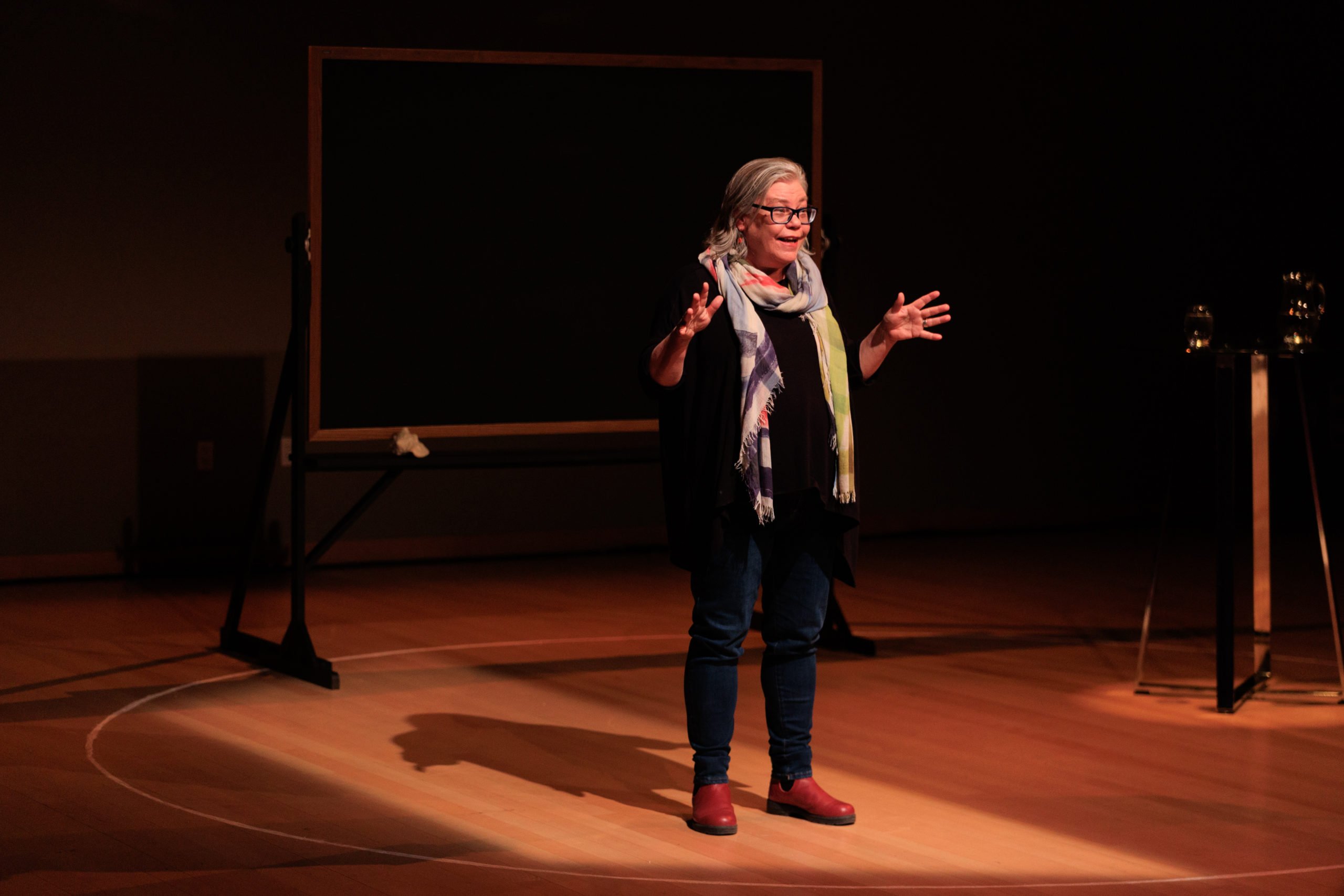With her back to the audience, Alanna Mitchell scribbled statistics onto a blackboard as Bob Dylan’s “The Times They Are a-Changin’” played in the background. With rhythmic taps of the chalk and fluid movements of her arm, Mitchell transformed writing ocean acidity into a dance-like performance. In her one-woman show “Sea Sick,” Mitchell endows dry numbers with emotive power and moral relevance by translating scientific knowledge into narrative and performance.
“Science gives us knowledge but not meaning. Art gives us meaning,” Mitchell said.
On Saturday night, Stanford Live invited Alanna Mitchell to perform “Sea Sick” in Bing Studio. She told wondrous stories from her expeditions into the ocean, urging her audience to confront how climate change has ravaged this crucial ecosystem. Mitchell emphasized that “the ocean contains the switch of life” — if everything on land died, creatures in the ocean would still go on living, but if everything in the ocean died, creatures on land would not be able to survive.
Growing up on the prairies as a child, Mitchell did not expect to spend her career writing about the ocean. “Sea Sick” originates from Mitchell’s 2009 book of the same name, which she turned into a monologue to more vividly convey her research. The title, “Sea Sick,” captures both Mitchell’s personal fear of open water and the thesis of her performance — that the ocean is sick. Beyond being a warning about climate change, the show is also an existential pondering of the power of words in the face of imminent catastrophe. Ultimately, Mitchell attempts to find ease where there is none as she tells the audience to forgive themselves and to forgive each other as the first step to alleviating climate change. The show ends with a notable emptiness, however, as Mitchell does not propose any concrete actions.
Mitchell’s gorgeous storytelling weaves together her underwater adventures to depict the ocean as a place full of mystery and enchantment. Basking under a ring of cerulean light, Mitchell began a story of snorkeling in the ocean near Panama and watching the annual coral spawning. On the sixth day after the last full moon of the summer, exactly 100 minutes after sunset, corals began to release their eggs and sperm into the pitch dark ocean water. Mitchell described feeling the throttling of the corals’ sexual energy in the water. But this miracle of birth became tinged with a sense of despair, as the marine biologists on Mitchell’s trip realized that only a quarter of the corals had spawned: increased atmospheric carbon dioxide had made the water too warm for the coral to reproduce, resulting in this rare ritual of birth being tainted with death.
Witnessing the ailing ocean prompted Mitchell to embark on marine expeditions to learn more about the effects of global warming on this crucial life source for the Earth. Throughout her journey, she is repeatedly struck by the distressing notion that “the ocean is warm, breathless and sour.” As she writes down data of the ocean’s increasingly acidic pH levels from dissolved carbon dioxide, she urgently appeals to the audience: “I need you to understand what this means.” She highlights the need for the foreboding impact of carbon emissions not only to be told, but to be heard.
Mitchell movingly ponders her place in telling this story that seems too big to handle. She confesses her own feeling of helplessness as she realizes the magnitude of the task before her. She flashes back to her twelfth-grade English teacher’s disparaging comment: “You’ve never had an original thought in your life, and never will.” In addition to lightening the mood with humor, Mitchell uses this flashback to demonstrate the same sense of personal inadequacy that overtook her. Self-doubt and guilt gripped her as she questioned what she — a little girl from the prairie — could do to save the ocean and save humanity from itself.
Her answer to alleviating climate change is to forgive ourselves. She reiterates that this forgiveness is not cheap grace, but “steely, intentional, catalytic.” Forgiveness would allow us to take the energy we channel into guilt and anguish and redirect it toward finding solutions and enacting institutional change. Mitchell frames mankind’s journey to reverse climate change as a quest and encourages audiences to be the heroes to save ourselves from extinction.
There is a refreshing strength behind Mitchell’s message of forgiveness, yet it is a weak note to end on for a show that tries to inspire action and propel systemic change. Forgiveness is too abstract a step to take — the conclusion wasted the show’s momentum, grinding it to a skidding halt; the answer that Mitchell arrives at rings hollow. Granted, Mitchell displays honesty and sincerity in her concession that the question of how to enact the systemic change required to reduce carbon dioxide emissions remains unanswered.
Still, the unsatisfying conclusion to “Sea Sick” prompts a further existential quandary: are narratives about climate change bound to end in either empty hope or certain doom? How do we rewrite this story that is hurtling towards a bleak conclusion?
Editor’s Note: This article is a review and includes subjective opinions, thoughts and critiques.
